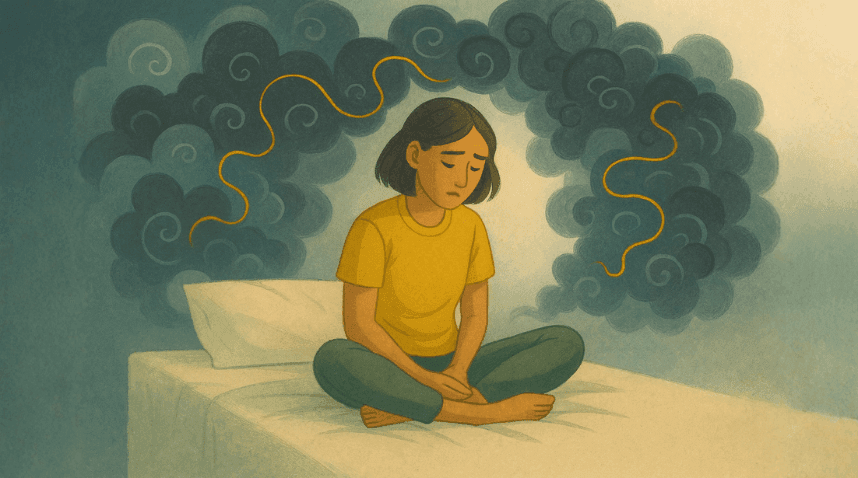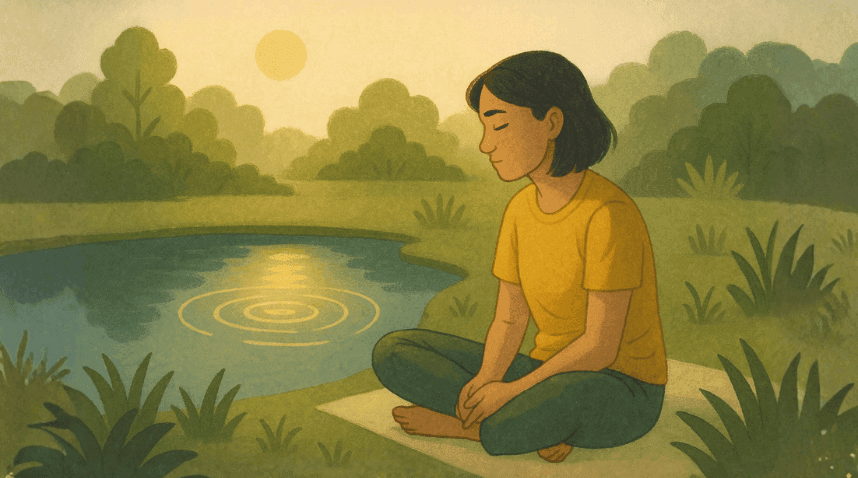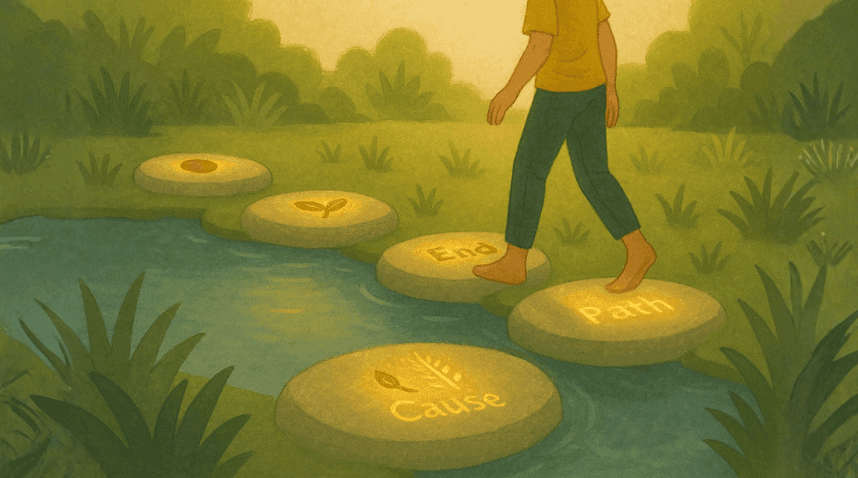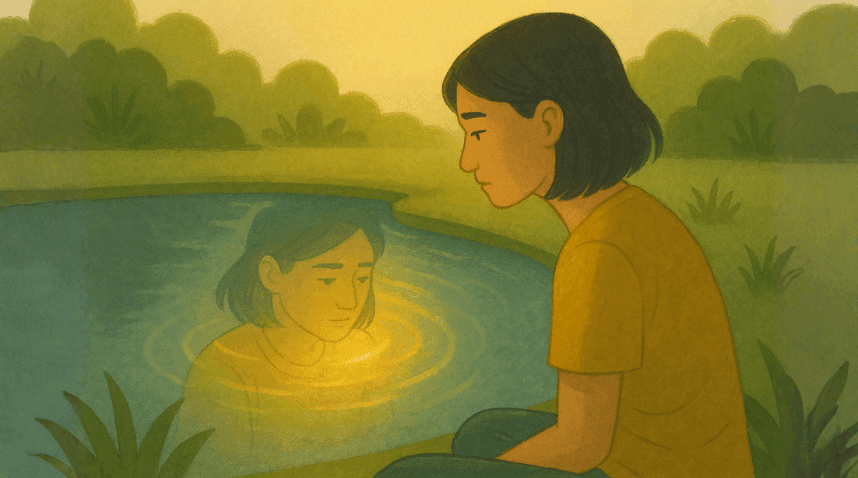TL;DR: Anxiety often comes from clinging to the past or fearing the future. The Buddha’s teachings offer practical tools to meet it with mindfulness, not panic.
It’s 3 AM, and I’m lying in bed with my heart racing about a presentation I have to give next week. My mind is spinning through every possible scenario where things could go wrong. Forgetting my words, technical difficulties, and the judgmental looks from colleagues. Sound familiar?
Anxiety, that unwelcome guest in the mind, has a way of barging in unannounced and overstaying its welcome. For years, I thought this was just how my brain worked – a constant hum of “what if” scenarios playing in the background. But the Buddha’s teachings offered me something I didn’t expect: not just understanding, but actual tools that work.

When the Mind Won’t Stop Racing
The Buddha once said, “You shouldn’t chase after the past or place expectations on the future. What is past is left behind. The future is as yet unreached. Whatever quality is present you clearly see right there, right there.”
Easy to say when you’re enlightened, I used to think. But here’s what I’ve learned after countless nights spent catastrophizing: anxiety lives almost entirely in the past and future.
Think about it. When was the last time you felt anxious about what was actually happening right now? I mean really happening – not what you thought it meant, or what it might lead to, but the actual present moment. More often than not, right now is okay. It’s the stories we tell ourselves about what happened or what might happen that send our nervous systems into overdrive.
I remember one particularly rough patch during my university years when I was convinced I’d fail my final exams. I spent weeks in a state of panic, barely sleeping, constantly checking and rechecking my study schedule. It wasn’t until I sat down for the actual exam that I realised I’d been torturing myself over hypothetical scenarios.
The exam itself? Manageable. The weeks of anxiety leading up to it? Completely unnecessary suffering.

Mindfulness: Not Just Another Buzzword
Mindfulness gets thrown around a lot these days, but in the Buddhist context, it’s not about achieving some zen-like state of perpetual calm. It’s about learning to observe your thoughts and emotions without getting swept away by them.
When anxiety hits, our instinct is usually to either fight it or flee from it. We try to think our way out of anxious thoughts, or we distract ourselves with Netflix, social media, or whatever else might numb the discomfort. But mindfulness offers a third option: just watching.
I started with just five minutes a day, sitting quietly and placing awareness on my breath. Not trying to stop anxious thoughts, but noticing when they arise and gently returning my attention to the present moment. It felt awkward at first, like trying to have a conversation with someone while a construction crew worked outside.
But gradually, I learned to step back from anxious thoughts and recognise them as passing phenomena rather than absolute truths.
The breakthrough came when I realised I wasn’t my thoughts. That voice in my head predicting doom and gloom? It’s not me. It’s just mental chatter, as impermanent as clouds passing through the sky.

The Four Noble Truths: A Framework for Understanding
The Buddha’s Four Noble Truths provide a surprisingly practical framework for understanding anxiety:
First Truth: Suffering exists. This includes mental suffering like anxiety. There’s something oddly comforting about this acknowledgement that you’re not broken for experiencing anxiety. It’s part of the human condition.
Second Truth: Suffering has a cause. Anxiety often arises from our attachment to outcomes and our resistance to uncertainty. We want things to be different from how they are, and we exhaust ourselves trying to control what we cannot.
Third Truth: Suffering can end. This doesn’t mean we’ll never feel anxious again, but we can change our relationship with anxiety so it doesn’t dominate our lives.
Fourth Truth: There’s a path to freedom. The Noble Eightfold Path offers practical steps – right mindfulness, right concentration, right effort, those actually work.
I used to think the Second Truth was too simplistic. “Just stop being attached,” I’d tell myself, as if it were that easy. But attachment isn’t about caring less, it’s about holding our desires and expectations more lightly. When I stopped needing everything to go perfectly, anxiety lost much of its power over me.
Rewiring Anxious Thinking
The Majjhima Nikaya contains some of the Buddha’s most practical advice for dealing with difficult mental states. In MN 19, he talks about observing thoughts without getting caught up in them. This isn’t about suppressing anxious thoughts, it’s about changing your relationship with them.
“When I reflected that it blocks wisdom, it’s on the side of distress, and it doesn’t lead to extinguishment, it went away.” – MN19
When I catch myself spiralling into worst-case scenarios, I try to pause and ask: “Is this thought helpful right now?” Usually, the answer is no. Worrying about whether my boss thinks I’m incompetent doesn’t make me a better employee. Replaying an awkward conversation from three days ago doesn’t change what happened.
The Buddha’s advice in MN 20 about cultivating wholesome thoughts has been game-changing for me. Instead of trying to force out anxious thoughts, I’ve learned to crowd them out with more helpful ones.
“Take a mendicant who is focusing on some subject that gives rise to bad, unskillful thoughts connected with desire, hate, and delusion. That mendicant should focus on some other subject connected with the skillful. As they do so, those bad thoughts are given up and come to an end” – MN 20
When I notice my mind going down a rabbit hole of worry, I might shift my attention to gratitude or remind myself of times I’ve handled challenges successfully.

The Illusion of a Separate Self
Here’s where Buddhist psychology gets really interesting. Venerable Amy Miller, a Tibetan Nun, points out that anxiety often stems from our exaggerated sense of self. We create this story about who we are, what we need to succeed, what threatens us, and then we exhaust ourselves trying to protect this fictional character.
I think about all the times I’ve felt anxious about “looking stupid” or “not measuring up.” Looking stupid to whom? Measuring up to what standard? When I really examine these fears, they often dissolve. The “self” that feels threatened by giving a bad presentation or making a social mistake, that self is largely a mental construction.
This doesn’t mean we don’t exist or that nothing matters. It means we can hold our sense of self more lightly. When I stopped taking my ego so seriously, anxiety became much more manageable.
What Actually Works
After years of trial and error, here’s what I’ve found helpful:
- Daily meditation, even just 10 minutes. Not to achieve some perfect state, but to practice observing thoughts without getting lost in them.
- Questioning anxious thoughts. Is this thought true? Is it helpful? What would I tell a friend who had this thought?
- Remembering impermanence. This anxiety will pass. This situation will change. Nothing lasts forever.
- Focusing on what I can control. I can’t control whether people like my presentation, but I can prepare well and speak from the heart.
- Accepting uncertainty. Life is inherently uncertain. Fighting this fact creates suffering.
The Path Forward
The Buddha’s teachings don’t promise that anxiety will disappear overnight. They offer something better: a way to live with more ease, even when difficult emotions arise. The goal isn’t to eliminate anxiety entirely, it’s to change our relationship with it.
Some days I still wake up with that familiar tightness in my chest. But now I have tools. I can sit with the discomfort without making it worse with resistance. I can observe anxious thoughts without believing everything they tell me. I can remember that this too shall pass.
As the Buddha taught, we all have the capacity to free ourselves from unnecessary suffering. It takes patience, practice, and a willingness to question our assumptions about how things should be. But the freedom waiting on the other side is worth every moment of effort.
May you find peace in the midst of uncertainty, and may your anxiety become a teacher rather than a tyrant.


